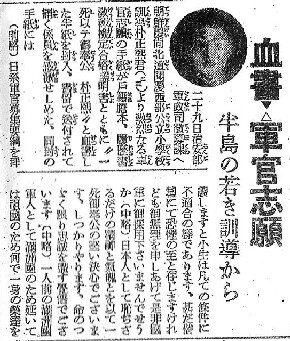hankyoreh
Links to other country sites 다른 나라 사이트 링크
Evidence of Park Chung-hee’s military allegiance to Japan surfaces

A newspaper article has been discovered that shows that late President Park Chung-hee, when volunteering to become a soldier in Japanese-occupied Manchukuo, wrote an oath of allegiance to Japan in his own blood. This is the first time the allegation, which had been rumored, has been confirmed with objective evidence.
Prior to the full-scale release on Sunday of its encyclopedia on pro-Japanese figures during the colonial era, the Institute for Research in Collaboration Activities (IRCA) issued a surprise release Thursday with its content on Park, whom it lists as a pro-Japanese figure in the encyclopedia. In addition, it released a 1939 article from the Manshu Shimbun (Manchuria Newspaper) that shows that Park sent with his application form to become a soldier serving Manchukuo, a puppet state in Manchuria, an oath of loyalty written in blood and a supplication letter.
The Manshu Shimbun, published by Japanese in Manchukuo, ran a story entitled “Application to Become a Soldier Written in Blood” on page 7 of its March 31, 1939 edition. It reported that Park Chung-hee, age 23, a teacher at Seobu Public Elementary School in Mungyeong located in Korea’s North Gyeongsang province, had sent with his passionate application letter his family registry, resume, drill passage certificate and a letter written in blood that read, “Loyalty Up to Sacrificing My Own Life, Park Chung-hee,” which moved the official who received it.
The paper also reported that Park wrote in the letter that he eagerly wanted to be a Manchukuo soldier even though he might not be deserving of the position, and that he had the firm determination to proudly sacrifice his life for Japan with the spirit that he was not ashamed to be Japanese. He also said that he was not seeking personal recognition for his sacrifice, and that he pledged both humble loyalty and self-annihilation for the sake of the country.
Not only was Park, then employed as a teacher, not serving as a soldier, but at 23, he was past the age limit (19 years old) so was unqualified to apply. The article ended by saying that because he was too old, he was, unfortunately, politely turned down. With the help of an acquaintance, however, Park entered the four-year Manchukuo Military Academy in Jan. the next year and became a lieutenant in the Manchukuo Army.
Cho Se-yeol, the secretary general of the Institute for Research in Collaboration Activities, said that the IRCA’s encyclopedia is becoming a source of political controversy prior to its publication because Park Chung-hee’s son Park Ji-man has referred to the encyclopedia entry as a mischaracterization of the late president's life and has applied for a ban on its printing and distribution Cho added that since the IRCA has publicly shared objective content regarding Park’s pro-Japanese behavior the unnecessary controversy has reached its conclusion.
Please direct questions or comments to [englishhani@hani.co.kr]
Editorial・opinion
![[Column] Park Geun-hye déjà vu in Yoon Suk-yeol [Column] Park Geun-hye déjà vu in Yoon Suk-yeol](https://flexible.img.hani.co.kr/flexible/normal/500/300/imgdb/original/2024/0424/651713945113788.jpg) [Column] Park Geun-hye déjà vu in Yoon Suk-yeol
[Column] Park Geun-hye déjà vu in Yoon Suk-yeol![[Editorial] New weight of N. Korea’s nuclear threats makes dialogue all the more urgent [Editorial] New weight of N. Korea’s nuclear threats makes dialogue all the more urgent](https://flexible.img.hani.co.kr/flexible/normal/500/300/imgdb/original/2024/0424/7317139454662664.jpg) [Editorial] New weight of N. Korea’s nuclear threats makes dialogue all the more urgent
[Editorial] New weight of N. Korea’s nuclear threats makes dialogue all the more urgent- [Guest essay] The real reason Korea’s new right wants to dub Rhee a founding father
- [Column] ‘Choson’: Is it time we start referring to N. Korea in its own terms?
- [Editorial] Japan’s rewriting of history with Korea has gone too far
- [Column] The president’s questionable capacity for dialogue
- [Column] Are chaebol firms just pizza pies for families to divvy up as they please?
- [Column] Has Korea, too, crossed the Rubicon on China?
- [Correspondent’s column] In Japan’s alliance with US, echoes of its past alliances with UK
- [Editorial] Does Yoon think the Korean public is wrong?
Most viewed articles
- 1‘We must say no’: Seoul defense chief on Korean, USFK involvement in hypothetical Taiwan crisis
- 2N. Korean delegation’s trip to Iran shows how Pyongyang is leveraging ties with Moscow
- 3Amnesty notes ‘erosion’ of freedom of expression in Korea in annual human rights report
- 4[Column] Park Geun-hye déjà vu in Yoon Suk-yeol
- 5‘Weddingflation’ breaks the bank for Korean couples-to-be
- 6[Reportage] On US campuses, student risk arrest as they call for divestment from Israel
- 7[Editorial] New weight of N. Korea’s nuclear threats makes dialogue all the more urgent
- 8Why Korea shouldn’t welcome Japan’s newly beefed up defense cooperation with US
- 9[Guest essay] The real reason Korea’s new right wants to dub Rhee a founding father
- 10Will NewJeans end up collateral damage in internal feud at K-pop juggernaut Hybe?